Evaluating ICT's Impact on Glasgow Travel & Tourism SMEs
VerifiedAdded on 2021/01/27
|5
|2029
|156
Report
AI Summary
This report evaluates the impact of Information and Communication Technology (ICT) usage on the performance of Small and Medium Enterprises (SMEs) within the travel and tourism sector in the Glasgow region. It begins by establishing the research background, highlighting the transformative role of ICT in modern business operations and its particular benefits for SMEs. The report emphasizes the importance of ICT adoption for competitiveness, referencing the significant contribution of UK SMEs to the economy and the specific advantages ICT offers to the service sector, especially travel and tourism. The research aims to identify the nexus between ICT adoption and SME performance, focusing on the Glasgow region, and to recommend strategies for improving performance through ICT. The study poses key research questions regarding the relationship between ICT and SME performance, the limiting factors hindering ICT adoption, and the potential ICT-based strategies for improvement. The significance of the research lies in the travel and tourism industry's reliance on digital operations, analyzing why Glasgow-based SMEs may not be performing as well as those in London. The report's structure includes an introduction, literature review, methodology, analysis, and conclusion, with key definitions provided for clarity. The findings are expected to offer valuable insights for Glasgow SMEs on leveraging ICT to enhance their performance and efficiency.
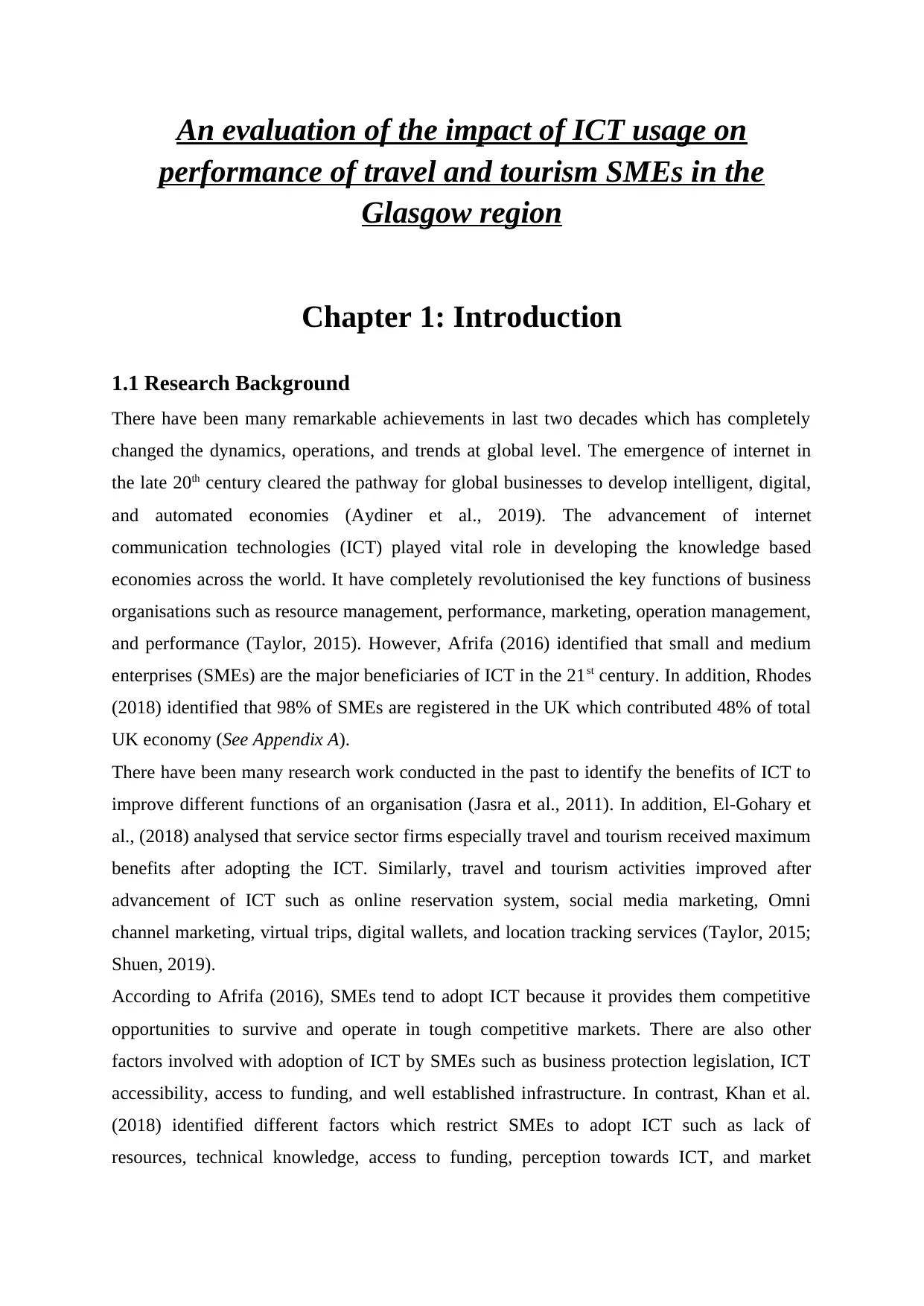
An evaluation of the impact of ICT usage on
performance of travel and tourism SMEs in the
Glasgow region
Chapter 1: Introduction
1.1 Research Background
There have been many remarkable achievements in last two decades which has completely
changed the dynamics, operations, and trends at global level. The emergence of internet in
the late 20th century cleared the pathway for global businesses to develop intelligent, digital,
and automated economies (Aydiner et al., 2019). The advancement of internet
communication technologies (ICT) played vital role in developing the knowledge based
economies across the world. It have completely revolutionised the key functions of business
organisations such as resource management, performance, marketing, operation management,
and performance (Taylor, 2015). However, Afrifa (2016) identified that small and medium
enterprises (SMEs) are the major beneficiaries of ICT in the 21st century. In addition, Rhodes
(2018) identified that 98% of SMEs are registered in the UK which contributed 48% of total
UK economy (See Appendix A).
There have been many research work conducted in the past to identify the benefits of ICT to
improve different functions of an organisation (Jasra et al., 2011). In addition, El-Gohary et
al., (2018) analysed that service sector firms especially travel and tourism received maximum
benefits after adopting the ICT. Similarly, travel and tourism activities improved after
advancement of ICT such as online reservation system, social media marketing, Omni
channel marketing, virtual trips, digital wallets, and location tracking services (Taylor, 2015;
Shuen, 2019).
According to Afrifa (2016), SMEs tend to adopt ICT because it provides them competitive
opportunities to survive and operate in tough competitive markets. There are also other
factors involved with adoption of ICT by SMEs such as business protection legislation, ICT
accessibility, access to funding, and well established infrastructure. In contrast, Khan et al.
(2018) identified different factors which restrict SMEs to adopt ICT such as lack of
resources, technical knowledge, access to funding, perception towards ICT, and market
performance of travel and tourism SMEs in the
Glasgow region
Chapter 1: Introduction
1.1 Research Background
There have been many remarkable achievements in last two decades which has completely
changed the dynamics, operations, and trends at global level. The emergence of internet in
the late 20th century cleared the pathway for global businesses to develop intelligent, digital,
and automated economies (Aydiner et al., 2019). The advancement of internet
communication technologies (ICT) played vital role in developing the knowledge based
economies across the world. It have completely revolutionised the key functions of business
organisations such as resource management, performance, marketing, operation management,
and performance (Taylor, 2015). However, Afrifa (2016) identified that small and medium
enterprises (SMEs) are the major beneficiaries of ICT in the 21st century. In addition, Rhodes
(2018) identified that 98% of SMEs are registered in the UK which contributed 48% of total
UK economy (See Appendix A).
There have been many research work conducted in the past to identify the benefits of ICT to
improve different functions of an organisation (Jasra et al., 2011). In addition, El-Gohary et
al., (2018) analysed that service sector firms especially travel and tourism received maximum
benefits after adopting the ICT. Similarly, travel and tourism activities improved after
advancement of ICT such as online reservation system, social media marketing, Omni
channel marketing, virtual trips, digital wallets, and location tracking services (Taylor, 2015;
Shuen, 2019).
According to Afrifa (2016), SMEs tend to adopt ICT because it provides them competitive
opportunities to survive and operate in tough competitive markets. There are also other
factors involved with adoption of ICT by SMEs such as business protection legislation, ICT
accessibility, access to funding, and well established infrastructure. In contrast, Khan et al.
(2018) identified different factors which restrict SMEs to adopt ICT such as lack of
resources, technical knowledge, access to funding, perception towards ICT, and market
Paraphrase This Document
Need a fresh take? Get an instant paraphrase of this document with our AI Paraphraser
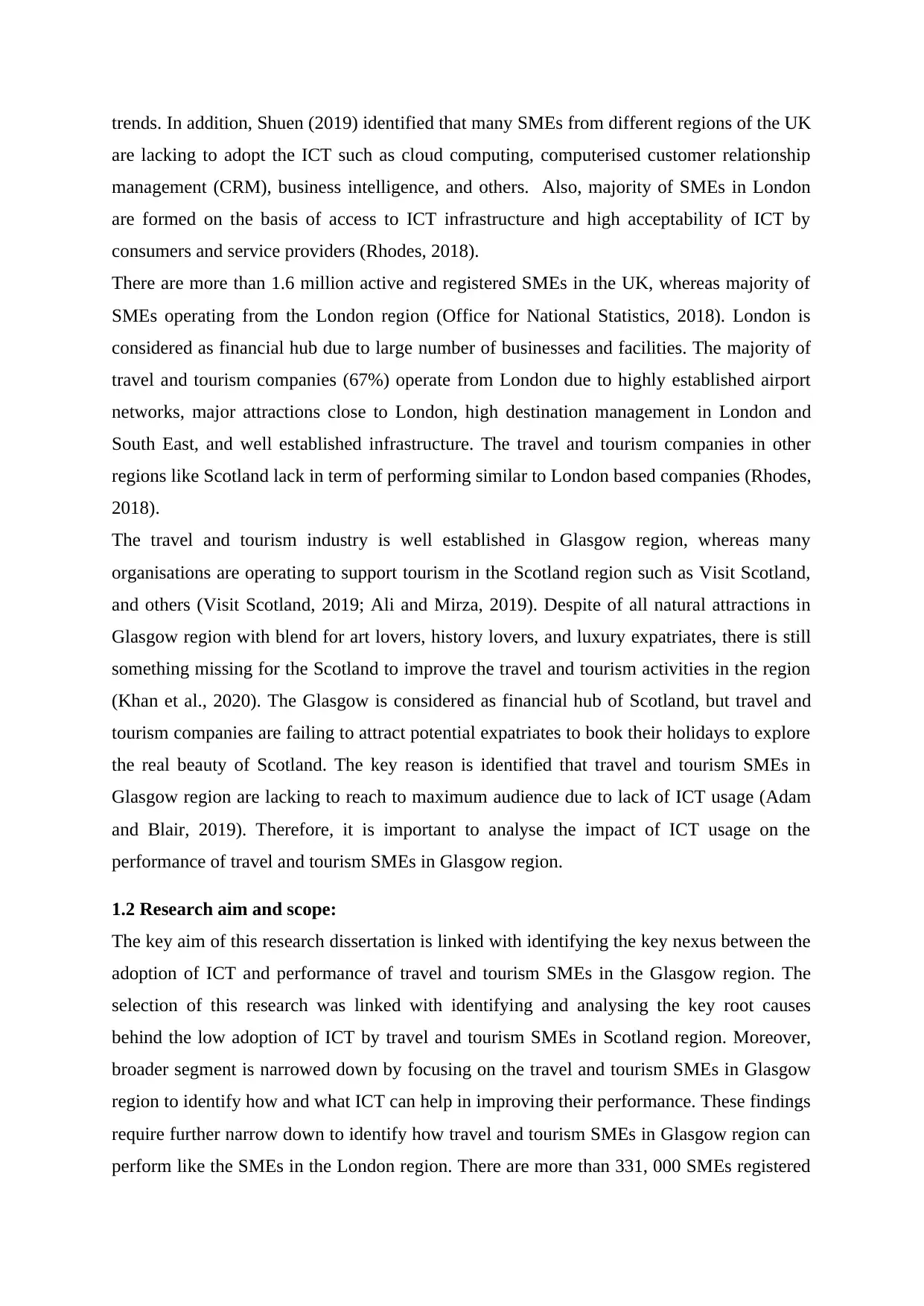
trends. In addition, Shuen (2019) identified that many SMEs from different regions of the UK
are lacking to adopt the ICT such as cloud computing, computerised customer relationship
management (CRM), business intelligence, and others. Also, majority of SMEs in London
are formed on the basis of access to ICT infrastructure and high acceptability of ICT by
consumers and service providers (Rhodes, 2018).
There are more than 1.6 million active and registered SMEs in the UK, whereas majority of
SMEs operating from the London region (Office for National Statistics, 2018). London is
considered as financial hub due to large number of businesses and facilities. The majority of
travel and tourism companies (67%) operate from London due to highly established airport
networks, major attractions close to London, high destination management in London and
South East, and well established infrastructure. The travel and tourism companies in other
regions like Scotland lack in term of performing similar to London based companies (Rhodes,
2018).
The travel and tourism industry is well established in Glasgow region, whereas many
organisations are operating to support tourism in the Scotland region such as Visit Scotland,
and others (Visit Scotland, 2019; Ali and Mirza, 2019). Despite of all natural attractions in
Glasgow region with blend for art lovers, history lovers, and luxury expatriates, there is still
something missing for the Scotland to improve the travel and tourism activities in the region
(Khan et al., 2020). The Glasgow is considered as financial hub of Scotland, but travel and
tourism companies are failing to attract potential expatriates to book their holidays to explore
the real beauty of Scotland. The key reason is identified that travel and tourism SMEs in
Glasgow region are lacking to reach to maximum audience due to lack of ICT usage (Adam
and Blair, 2019). Therefore, it is important to analyse the impact of ICT usage on the
performance of travel and tourism SMEs in Glasgow region.
1.2 Research aim and scope:
The key aim of this research dissertation is linked with identifying the key nexus between the
adoption of ICT and performance of travel and tourism SMEs in the Glasgow region. The
selection of this research was linked with identifying and analysing the key root causes
behind the low adoption of ICT by travel and tourism SMEs in Scotland region. Moreover,
broader segment is narrowed down by focusing on the travel and tourism SMEs in Glasgow
region to identify how and what ICT can help in improving their performance. These findings
require further narrow down to identify how travel and tourism SMEs in Glasgow region can
perform like the SMEs in the London region. There are more than 331, 000 SMEs registered
are lacking to adopt the ICT such as cloud computing, computerised customer relationship
management (CRM), business intelligence, and others. Also, majority of SMEs in London
are formed on the basis of access to ICT infrastructure and high acceptability of ICT by
consumers and service providers (Rhodes, 2018).
There are more than 1.6 million active and registered SMEs in the UK, whereas majority of
SMEs operating from the London region (Office for National Statistics, 2018). London is
considered as financial hub due to large number of businesses and facilities. The majority of
travel and tourism companies (67%) operate from London due to highly established airport
networks, major attractions close to London, high destination management in London and
South East, and well established infrastructure. The travel and tourism companies in other
regions like Scotland lack in term of performing similar to London based companies (Rhodes,
2018).
The travel and tourism industry is well established in Glasgow region, whereas many
organisations are operating to support tourism in the Scotland region such as Visit Scotland,
and others (Visit Scotland, 2019; Ali and Mirza, 2019). Despite of all natural attractions in
Glasgow region with blend for art lovers, history lovers, and luxury expatriates, there is still
something missing for the Scotland to improve the travel and tourism activities in the region
(Khan et al., 2020). The Glasgow is considered as financial hub of Scotland, but travel and
tourism companies are failing to attract potential expatriates to book their holidays to explore
the real beauty of Scotland. The key reason is identified that travel and tourism SMEs in
Glasgow region are lacking to reach to maximum audience due to lack of ICT usage (Adam
and Blair, 2019). Therefore, it is important to analyse the impact of ICT usage on the
performance of travel and tourism SMEs in Glasgow region.
1.2 Research aim and scope:
The key aim of this research dissertation is linked with identifying the key nexus between the
adoption of ICT and performance of travel and tourism SMEs in the Glasgow region. The
selection of this research was linked with identifying and analysing the key root causes
behind the low adoption of ICT by travel and tourism SMEs in Scotland region. Moreover,
broader segment is narrowed down by focusing on the travel and tourism SMEs in Glasgow
region to identify how and what ICT can help in improving their performance. These findings
require further narrow down to identify how travel and tourism SMEs in Glasgow region can
perform like the SMEs in the London region. There are more than 331, 000 SMEs registered
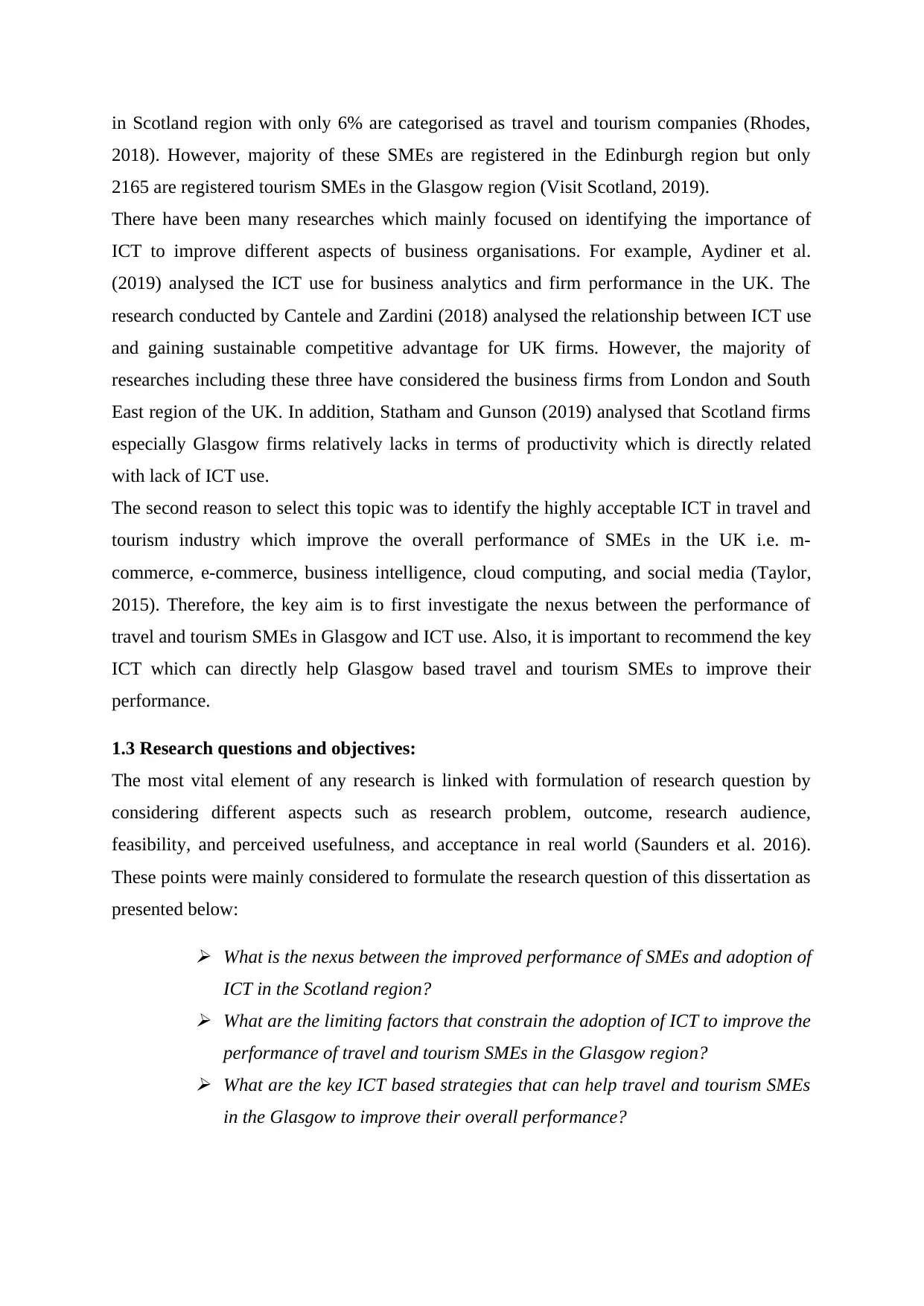
in Scotland region with only 6% are categorised as travel and tourism companies (Rhodes,
2018). However, majority of these SMEs are registered in the Edinburgh region but only
2165 are registered tourism SMEs in the Glasgow region (Visit Scotland, 2019).
There have been many researches which mainly focused on identifying the importance of
ICT to improve different aspects of business organisations. For example, Aydiner et al.
(2019) analysed the ICT use for business analytics and firm performance in the UK. The
research conducted by Cantele and Zardini (2018) analysed the relationship between ICT use
and gaining sustainable competitive advantage for UK firms. However, the majority of
researches including these three have considered the business firms from London and South
East region of the UK. In addition, Statham and Gunson (2019) analysed that Scotland firms
especially Glasgow firms relatively lacks in terms of productivity which is directly related
with lack of ICT use.
The second reason to select this topic was to identify the highly acceptable ICT in travel and
tourism industry which improve the overall performance of SMEs in the UK i.e. m-
commerce, e-commerce, business intelligence, cloud computing, and social media (Taylor,
2015). Therefore, the key aim is to first investigate the nexus between the performance of
travel and tourism SMEs in Glasgow and ICT use. Also, it is important to recommend the key
ICT which can directly help Glasgow based travel and tourism SMEs to improve their
performance.
1.3 Research questions and objectives:
The most vital element of any research is linked with formulation of research question by
considering different aspects such as research problem, outcome, research audience,
feasibility, and perceived usefulness, and acceptance in real world (Saunders et al. 2016).
These points were mainly considered to formulate the research question of this dissertation as
presented below: What is the nexus between the improved performance of SMEs and adoption of
ICT in the Scotland region?
What are the limiting factors that constrain the adoption of ICT to improve the
performance of travel and tourism SMEs in the Glasgow region?
What are the key ICT based strategies that can help travel and tourism SMEs
in the Glasgow to improve their overall performance?
2018). However, majority of these SMEs are registered in the Edinburgh region but only
2165 are registered tourism SMEs in the Glasgow region (Visit Scotland, 2019).
There have been many researches which mainly focused on identifying the importance of
ICT to improve different aspects of business organisations. For example, Aydiner et al.
(2019) analysed the ICT use for business analytics and firm performance in the UK. The
research conducted by Cantele and Zardini (2018) analysed the relationship between ICT use
and gaining sustainable competitive advantage for UK firms. However, the majority of
researches including these three have considered the business firms from London and South
East region of the UK. In addition, Statham and Gunson (2019) analysed that Scotland firms
especially Glasgow firms relatively lacks in terms of productivity which is directly related
with lack of ICT use.
The second reason to select this topic was to identify the highly acceptable ICT in travel and
tourism industry which improve the overall performance of SMEs in the UK i.e. m-
commerce, e-commerce, business intelligence, cloud computing, and social media (Taylor,
2015). Therefore, the key aim is to first investigate the nexus between the performance of
travel and tourism SMEs in Glasgow and ICT use. Also, it is important to recommend the key
ICT which can directly help Glasgow based travel and tourism SMEs to improve their
performance.
1.3 Research questions and objectives:
The most vital element of any research is linked with formulation of research question by
considering different aspects such as research problem, outcome, research audience,
feasibility, and perceived usefulness, and acceptance in real world (Saunders et al. 2016).
These points were mainly considered to formulate the research question of this dissertation as
presented below: What is the nexus between the improved performance of SMEs and adoption of
ICT in the Scotland region?
What are the limiting factors that constrain the adoption of ICT to improve the
performance of travel and tourism SMEs in the Glasgow region?
What are the key ICT based strategies that can help travel and tourism SMEs
in the Glasgow to improve their overall performance?
⊘ This is a preview!⊘
Do you want full access?
Subscribe today to unlock all pages.

Trusted by 1+ million students worldwide
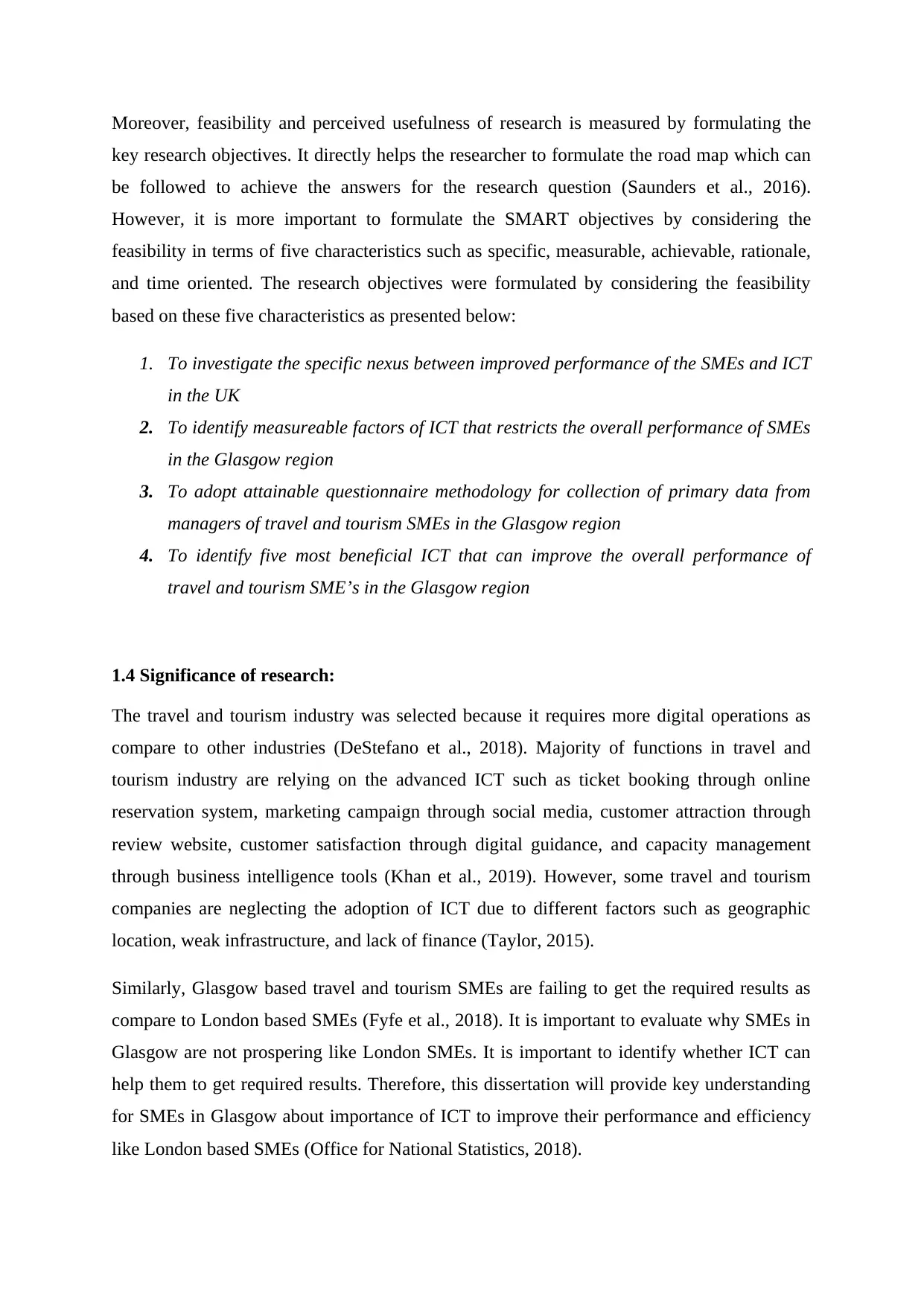
Moreover, feasibility and perceived usefulness of research is measured by formulating the
key research objectives. It directly helps the researcher to formulate the road map which can
be followed to achieve the answers for the research question (Saunders et al., 2016).
However, it is more important to formulate the SMART objectives by considering the
feasibility in terms of five characteristics such as specific, measurable, achievable, rationale,
and time oriented. The research objectives were formulated by considering the feasibility
based on these five characteristics as presented below:
1. To investigate the specific nexus between improved performance of the SMEs and ICT
in the UK
2. To identify measureable factors of ICT that restricts the overall performance of SMEs
in the Glasgow region
3. To adopt attainable questionnaire methodology for collection of primary data from
managers of travel and tourism SMEs in the Glasgow region
4. To identify five most beneficial ICT that can improve the overall performance of
travel and tourism SME’s in the Glasgow region
1.4 Significance of research:
The travel and tourism industry was selected because it requires more digital operations as
compare to other industries (DeStefano et al., 2018). Majority of functions in travel and
tourism industry are relying on the advanced ICT such as ticket booking through online
reservation system, marketing campaign through social media, customer attraction through
review website, customer satisfaction through digital guidance, and capacity management
through business intelligence tools (Khan et al., 2019). However, some travel and tourism
companies are neglecting the adoption of ICT due to different factors such as geographic
location, weak infrastructure, and lack of finance (Taylor, 2015).
Similarly, Glasgow based travel and tourism SMEs are failing to get the required results as
compare to London based SMEs (Fyfe et al., 2018). It is important to evaluate why SMEs in
Glasgow are not prospering like London SMEs. It is important to identify whether ICT can
help them to get required results. Therefore, this dissertation will provide key understanding
for SMEs in Glasgow about importance of ICT to improve their performance and efficiency
like London based SMEs (Office for National Statistics, 2018).
key research objectives. It directly helps the researcher to formulate the road map which can
be followed to achieve the answers for the research question (Saunders et al., 2016).
However, it is more important to formulate the SMART objectives by considering the
feasibility in terms of five characteristics such as specific, measurable, achievable, rationale,
and time oriented. The research objectives were formulated by considering the feasibility
based on these five characteristics as presented below:
1. To investigate the specific nexus between improved performance of the SMEs and ICT
in the UK
2. To identify measureable factors of ICT that restricts the overall performance of SMEs
in the Glasgow region
3. To adopt attainable questionnaire methodology for collection of primary data from
managers of travel and tourism SMEs in the Glasgow region
4. To identify five most beneficial ICT that can improve the overall performance of
travel and tourism SME’s in the Glasgow region
1.4 Significance of research:
The travel and tourism industry was selected because it requires more digital operations as
compare to other industries (DeStefano et al., 2018). Majority of functions in travel and
tourism industry are relying on the advanced ICT such as ticket booking through online
reservation system, marketing campaign through social media, customer attraction through
review website, customer satisfaction through digital guidance, and capacity management
through business intelligence tools (Khan et al., 2019). However, some travel and tourism
companies are neglecting the adoption of ICT due to different factors such as geographic
location, weak infrastructure, and lack of finance (Taylor, 2015).
Similarly, Glasgow based travel and tourism SMEs are failing to get the required results as
compare to London based SMEs (Fyfe et al., 2018). It is important to evaluate why SMEs in
Glasgow are not prospering like London SMEs. It is important to identify whether ICT can
help them to get required results. Therefore, this dissertation will provide key understanding
for SMEs in Glasgow about importance of ICT to improve their performance and efficiency
like London based SMEs (Office for National Statistics, 2018).
Paraphrase This Document
Need a fresh take? Get an instant paraphrase of this document with our AI Paraphraser
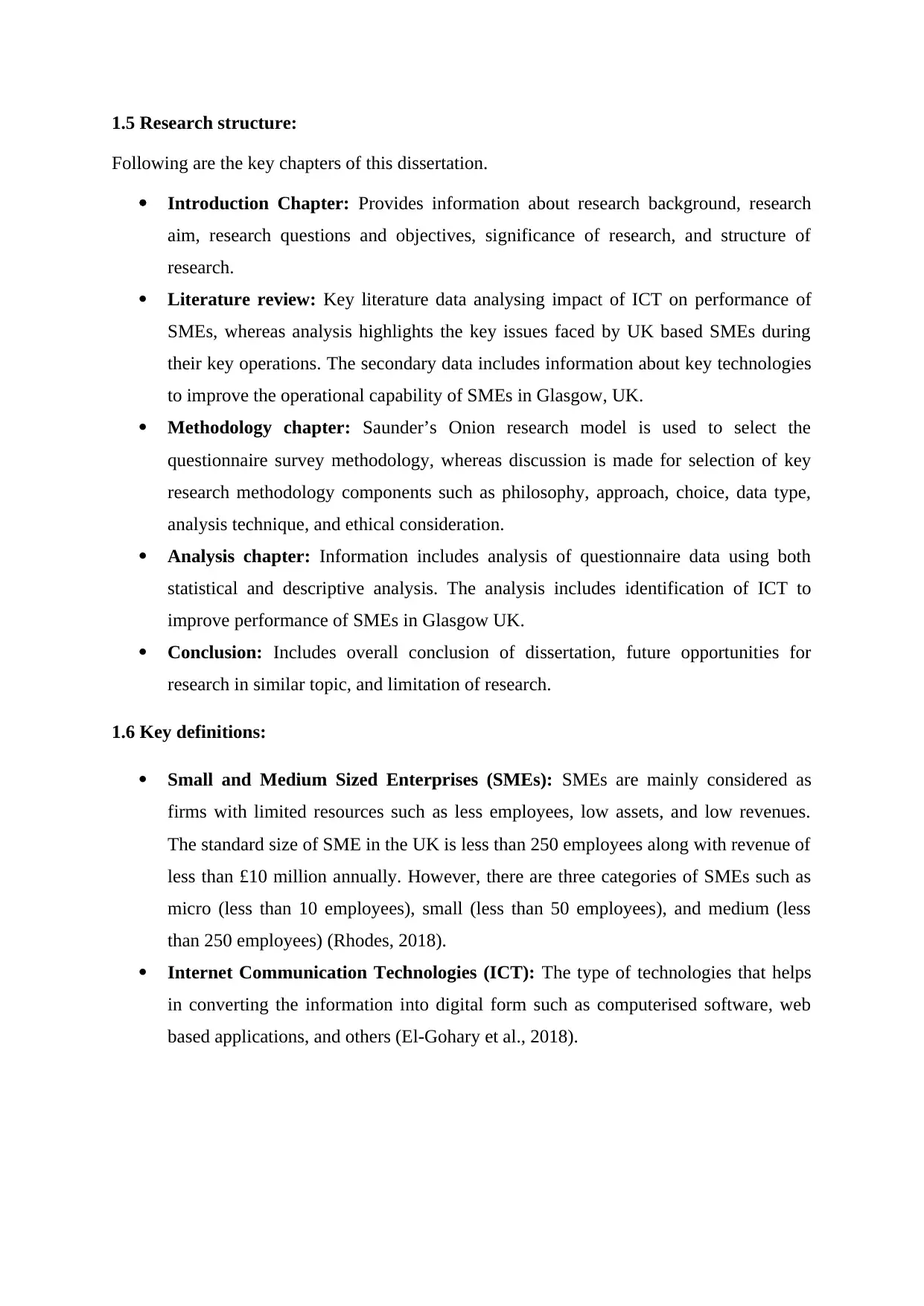
1.5 Research structure:
Following are the key chapters of this dissertation.
Introduction Chapter: Provides information about research background, research
aim, research questions and objectives, significance of research, and structure of
research.
Literature review: Key literature data analysing impact of ICT on performance of
SMEs, whereas analysis highlights the key issues faced by UK based SMEs during
their key operations. The secondary data includes information about key technologies
to improve the operational capability of SMEs in Glasgow, UK.
Methodology chapter: Saunder’s Onion research model is used to select the
questionnaire survey methodology, whereas discussion is made for selection of key
research methodology components such as philosophy, approach, choice, data type,
analysis technique, and ethical consideration.
Analysis chapter: Information includes analysis of questionnaire data using both
statistical and descriptive analysis. The analysis includes identification of ICT to
improve performance of SMEs in Glasgow UK.
Conclusion: Includes overall conclusion of dissertation, future opportunities for
research in similar topic, and limitation of research.
1.6 Key definitions:
Small and Medium Sized Enterprises (SMEs): SMEs are mainly considered as
firms with limited resources such as less employees, low assets, and low revenues.
The standard size of SME in the UK is less than 250 employees along with revenue of
less than £10 million annually. However, there are three categories of SMEs such as
micro (less than 10 employees), small (less than 50 employees), and medium (less
than 250 employees) (Rhodes, 2018).
Internet Communication Technologies (ICT): The type of technologies that helps
in converting the information into digital form such as computerised software, web
based applications, and others (El-Gohary et al., 2018).
Following are the key chapters of this dissertation.
Introduction Chapter: Provides information about research background, research
aim, research questions and objectives, significance of research, and structure of
research.
Literature review: Key literature data analysing impact of ICT on performance of
SMEs, whereas analysis highlights the key issues faced by UK based SMEs during
their key operations. The secondary data includes information about key technologies
to improve the operational capability of SMEs in Glasgow, UK.
Methodology chapter: Saunder’s Onion research model is used to select the
questionnaire survey methodology, whereas discussion is made for selection of key
research methodology components such as philosophy, approach, choice, data type,
analysis technique, and ethical consideration.
Analysis chapter: Information includes analysis of questionnaire data using both
statistical and descriptive analysis. The analysis includes identification of ICT to
improve performance of SMEs in Glasgow UK.
Conclusion: Includes overall conclusion of dissertation, future opportunities for
research in similar topic, and limitation of research.
1.6 Key definitions:
Small and Medium Sized Enterprises (SMEs): SMEs are mainly considered as
firms with limited resources such as less employees, low assets, and low revenues.
The standard size of SME in the UK is less than 250 employees along with revenue of
less than £10 million annually. However, there are three categories of SMEs such as
micro (less than 10 employees), small (less than 50 employees), and medium (less
than 250 employees) (Rhodes, 2018).
Internet Communication Technologies (ICT): The type of technologies that helps
in converting the information into digital form such as computerised software, web
based applications, and others (El-Gohary et al., 2018).
1 out of 5
Related Documents
Your All-in-One AI-Powered Toolkit for Academic Success.
+13062052269
info@desklib.com
Available 24*7 on WhatsApp / Email
![[object Object]](/_next/static/media/star-bottom.7253800d.svg)
Unlock your academic potential
Copyright © 2020–2026 A2Z Services. All Rights Reserved. Developed and managed by ZUCOL.


